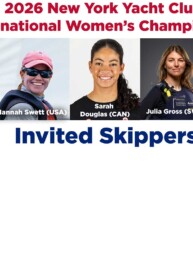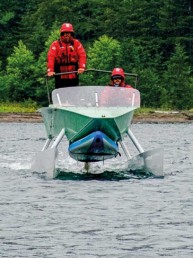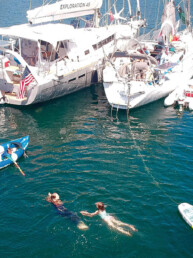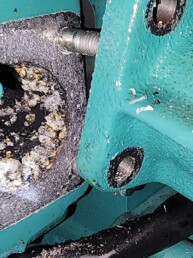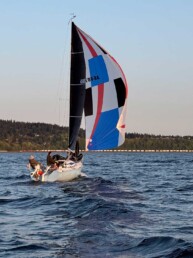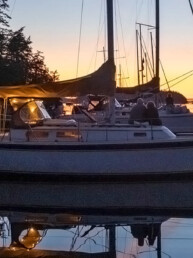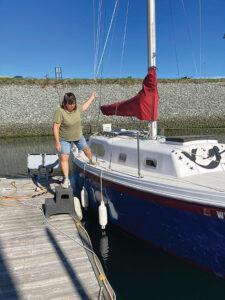
As I talk with more and more sailors, I am amazed at the expertise and experience that flood the conversations, reminding me of why sailing is so appealing. A competent sailor needs knowledge of weather, tides, and currents, as well as the ability to troubleshoot combustion engines, electrical systems, and mechanical malfunctions. And within each category, no aspect is more important than safety, whether dealing with technical issues or human error.
During one of our club’s general meetings, a member spoke about a recent injury that he incurred on the dock. As a cautionary tale, he warned everyone of the danger of being overconfident with procedures on your boat, even in something as routine as returning to your moorage after an afternoon outing.
The poor fellow was recovering from broken ribs and a punctured lung that happened while pulling into his slip, and then jumping onto the dock. “I had made the short leap hundreds, if not a thousand times from my boat onto the pier. But this time I missed, and the result was nearly catastrophic.”
With that in mind, every time that my wife, Laura, and I board our Columbia 28 Ariel, we make an effort to slow down and be present in the moment. While there are true accidents and unpredictable events, there are also situations that may be exacerbated because of poor planning or reactionary flare-ups.
In our exploration of Puget Sound, we try to remember that discretion is the better part of valor and, as new sailors, to be aware of our limitations. We’ve found the best approach is to balance our fears and uncertainties with adequate preparation, although seeing T-shirts that read “Fear the Strait” don’t exactly fill us with confidence.
Laura recently attended a seminar on first-mate preparedness, promoted as a “what to do when the captain is incapacitated.” She came home from the event rattling off quips and quotes for disaster prevention, such as: A knot in a line can reduce its strength by up to 50%; an anchor rode should have a 7-to-1 ratio of line-to-depth; the VHF radio, if properly registered and operated, can send help to a boat’s exact latitude and longitude; if someone goes overboard, their location may be difficult to find owing to the rise and fall of swells; don’t wear your life vest below decks; and, of course, store and maintain proper first aid kits, flares, and fire extinguishers.
Thankfully, neither Laura nor I have been seriously injured in our brief tenure with Ariel, nor have we experienced dislodged anchors, cabin fires, or a crew overboard. Still, I have had to live with other shortcomings and inadequacies that, while not always dangerous, impact our time on the water.
Combined with my particular personality, the lack of sailing knowledge all too often has led to frustrations, short tempers, and concerns. And true to Murphy’s Law, the incidents occur usually, if not always, when they are least expected and most inopportune. Recently, I experienced a minor blunder that exemplified how much I am still learning each time I’m on the water.
It was a day in which nothing appeared unusual or difficult in our marina. I shifted our boat’s Yamaha outboard in reverse, swung the tiller hard to starboard, and began to exit the slip. But instead of gently turning 90 degrees, Ariel refused to pivot. She just remained parallel to her berth drifting just behind the Cal 31, Barquinho, in the next slip over, sandwiched between her stern and a rocky shore.
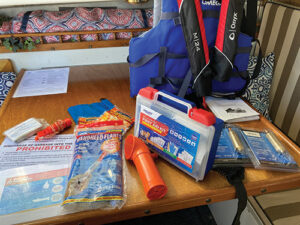
Were I to move forward, I’d crash into Barquinho. Moving aft, I’d smash into the rocks that border the marina’s basin. At that moment, I wondered how I ever thought I could become a proficient sailor, when I couldn’t even get the darn boat out of her slip!
So, after my profanities and temper subsided, Laura got out the boat hook and we were able to gently nudge Ariel toward her berth. I put the engine in forward and slowly inched back into the slip. Without seeing damage to the boat or the dock, I replayed the event in my head, wondering if a slow exit velocity and a hard starboard rudder actually impeded any movement of our boat. I had to consider that moving too quickly, and reacting to what I imagined could be a disaster, led to my short-fuse blowout.
As I continued to look beyond the moment, I envisioned desperation in far more challenging situations, whether they might be in the form of major equipment failure during a crossing of the Strait of Juan de Fuca or, even worse, crew overboard in stormy conditions.
There are situations when acting immediately is crucial in averting an accident or calamity. But perhaps equally true is realizing that moving too quickly out of fear or habit can also lead to problems.
In the battle of “take immediate action or wait,” experience may be the best weapon. A few months ago, I witnessed the completion of the Winter Vashon Race, observing the dousing of spinnakers as vessels changed their course to cross the finish.
One boat was unable to drop the billowing kite even after crossing the marker. I ignorantly thought that the crew was not paying attention, until an experienced boater watching the race with me explained that their halyard was probably jammed and they were doing their best to get out of the path of other finishing racers before dealing with the issue. Sure enough, in less than a minute the chute was down and the boat righted, motoring comfortably, collision-crisis averted.
As we become more involved and invested in the sailing community, we become privy to the stories and experiences of other sailors and racers. Those who can laugh and then learn about their near-misses teach us that we’re going to be alright, even in the middle of a crisis or when the weather takes a turn for the worse.
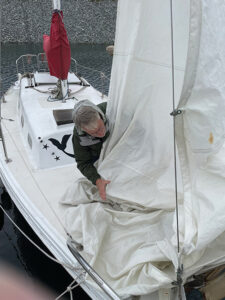
Laura and I have had only one minor incident with weather, heading through the Tacoma Narrows with winds and currents that churned the water, slowing our passage and tossing Ariel like a cork. It was accompanied by a brief episode that tested both my concentration and balance, as I headed to the bow to douse the jib.
Since Ariel is not equipped with roller furling, I usually manhandle the jib on the foredeck as Laura slowly lowers the halyard. I gather the headsail as quickly as I can, being careful to avoid the sheets and piling dacron at my feet. I’m well aware of the nearly absent lifelines at the bow of the boat, which angle towards the deck so as to allow the jib shape along the foot to be unimpeded on more points of sail. The open space presents itself as a dangerous invitation to plunge overboard, and one that I refuse at every offering.
With care and deliberation, the lowering of the jib on that day was completed without incident, and our only frustration was riding the seasick-inducing swells back to our harbor.
I think that we are hard-wired to remember the extreme, whether it is defined by danger and damage or beauty and joy. In our brief time with Ariel, we have managed to endure and enjoy mild cases of each end of the spectrum with many adventures ahead, each creating the possibility for personal and technical growth.
I admire the wisdom of some of my fellow 48° North storytellers who have shared tales of adapting, or even abandoning, their goals in the interest of safety; they seem to find peace in the journey and exaltation in their prudently flexible seamanship.
Like these exemplary and experienced sailors, cruisers, and adventurers, Laura and I find solace in each moment of an exploration. And we are reassured that these rewards are available to us whether the journey takes us just outside our local moorings of Tacoma, or well beyond them across the Strait of Juan de Fuca and up through the Inside Passage.
Each nautical mile has the potential to lead us to emotional paradise, or conversely, mental or physical anguish. Some events result in real damage while others take their toll in our negative interpretation and replaying of them. In those cases, it would be best to heed the words of Marcus Aurelius, the Roman Emperor in the second century:
“If you are pained by external things, it is not they that disturb you, but your own judgment of them. And it is in your power to wipe out that judgment now.”
I guess that I might have to add philosophy to the list of subjects that sailboat owners discuss. And while I ponder my personal contribution to that topic, I’ll keep learning and sailing and upholding the principle that discretion is still the better part of valor.
David Casey is a retired math teacher and semi-professional woodworker and bass player. He plans on using his retirement to build a small sailboat and a kayak, and to explore the waters of southern Puget Sound.

